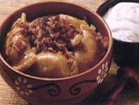Lithuanian Food Traditions
2010-11-10 16:04
Lithuanians like to eat good, tasty and filling foods. The tradition of eating well is inherited from the ancestors who would say, "he who eats well, works well". Lithuanian traditional cuisine took shape over many centuries and was much influenced by cultural contacts with neighbouring nations.
Lithuania is divided into five ethnic regions. This regional division is evident in foods that are particular to each region. The Highlanders (Aukstaiciai) live in the North Eastern region and are known for their pancakes and cottage cheese dishes. The Samogitians (Zemaiciai) inhabit the North Western region and have their special sour butter, porridges and gruels. Dzukai are the people of the South Eastern region and are main consumers of buckwheat, mushrooms and potatoes. Suvalkieciai, people of the South Western region favour smoked meat, sausages and cepelinai. Fish plays an important role in the diet of the seacoast Lithuanians and those living near lakes and rivers.
Lithuanians usually eat three times per day, and the most filling, sumptuous meal is lunch: soup, meat, potatoes etc. Breakfast and dinner are rather light meals.
One of the oldest and most fundamental staple food was and is rye bread (rugine duona). It is eaten every day for breakfast, lunch and dinner. Two kinds of bread are traditional - plain fermented and scalded. Plain fermented bread has been baked from ancient times, while scalded bread has only been baked since the beginning of the 20th century. Even though very few families bake bread at home now, they still value the traditional belief that bread is more valuable than gold.
Potatoes have become an essential starch staple and are eaten throughout the year. Many delicious dishes are made with potatoes. The most popular are cepelinai, kugelis, potato pancakes (bulviniai blynai), potato casseroles etc.
Another basic Lithuanian food is grain, such as rye, barley, oats, buckwhet, peas and oil crops (hemp, poppies, flax). Rye is still the most important crop, used mainly for rye bread. Groats and flour are made from wheat and barley.
Soup is eaten every day, too. Rich soups are served for lunch. Most popular soups are sauerkraut, beet and sorrel, with smoked meat as the base. Meat cooked in soup is often eaten as a second course. Most soups are served with bread or potatoes. In summer, cold beet soup with hot potatoes is very popular, as are cold sweet soups made with berries, fruit and tiny dumplings.
Lithuanians consume a lot of meat and its by-products. Pork has always been the most widely used meat - fresh, brined or smoked. For longer keeping, many varieties of sausage are made. Skilandis and other smoked meats are robust and delicious. Fowl meat is also popular. Domestic birds - chicken, geese, ducks - are cooked, smoked and baked.
Milk products have been popular since ancient times. It is used to make cheese, cottage cheese, sour cream and butter. Most popular is cheese (suris), which can be sour, sweet or flavored with caraway seed.
Lithuania is rich in mushrooms, and more than 400 edible varieties are found in the forests. Mushrooms are used in in many dishes to add special flavor to meat, fish and potato dishes. They are used fresh, dried, salted or marinated.
Fruits and berries and some vegetables are seasonal. During summer they are eaten fresh, but for winter supplies they are dried, fermented and pickled. The most popular fruits are apple, pear, plum, cherry; berries include strawberry, gooseberry, blueberry, cranberry, raspberry, currant. The most popular vegetables are cabbage, beet, carrot, cucumber, onion, turnip, radish, parsnip and horseradish.
Each housewife does her very best to pamper the family during the holidays. There are many recipes for all occasions, and a variety of cakes, cookies and sweet rolls are made. Among them there is the famous sakotis, a must for every special occasion, which originally came from Germany at the beginning of the 20th century.
************
Are you satisfied with our travel and leisure guide? The best thanks from you we get, if you book a hotel, an air ticket or rent a car by clicking on the links below. After this, we get some commission, which do not charge you anything, but help us to take care of this portal. A payment is safe, not in our servers - our chosen partners take care of the payments and keep your data safe through SSL technologies. Reliable partners have the widest choice of hotels, air companies, rent-a-car points. They can offer you the best prices and no extra charge. Our personnel tried those services travelling over the world and were very satisfied.
Buy airline tickets to Lithuania



